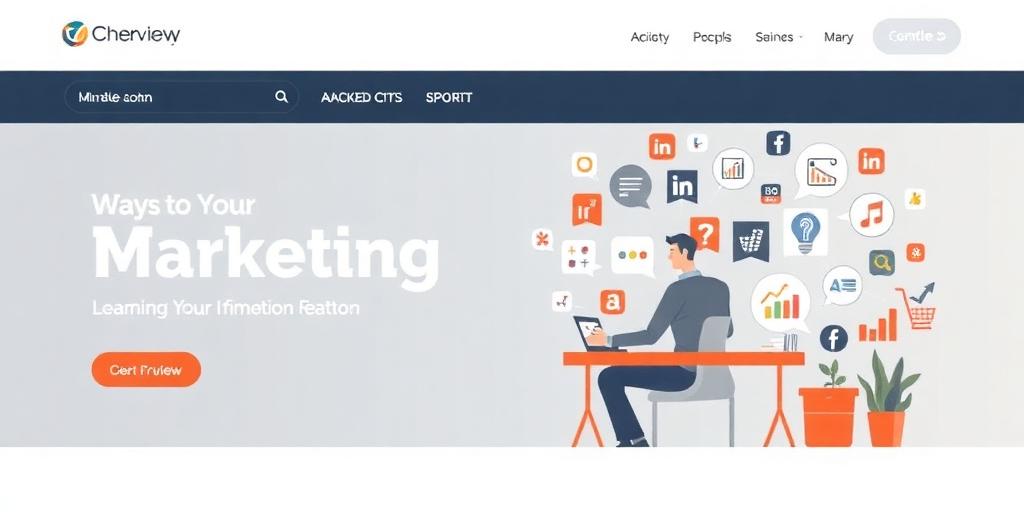Embarking on a marketing career from scratch can seem daunting, but with the right approach, it’s entirely achievable. This guide provides a structured pathway for aspiring marketers, detailing essential steps and resources to build a successful career.
1. Understanding the Marketing Landscape
Grasp Core Concepts
Begin by familiarizing yourself with fundamental marketing principles. Key areas include:
- Marketing Mix (4Ps): Product, Price, Place, Promotion.
- Market Segmentation: Dividing a broad consumer or business market into sub-groups of consumers based on shared characteristics.
- Targeting and Positioning: Selecting the segments to serve and the value proposition per segment.
- Branding: The process of creating a unique name and image for a product in the consumers' mind.
- Digital Marketing: Utilizing online channels to promote products or services.
Explore Specializations
Marketing encompasses various specializations. Identify which areas intrigue you the most:
- Digital Marketing: SEO, Content Marketing, Social Media Marketing, PPC.
- Brand Management: Overseeing brand strategy and identity.
- Market Research: Analyzing market trends and consumer behavior.
- Marketing Analytics: Measuring and analyzing marketing campaign performance.
- Product Marketing: Bringing products to market and ensuring their success.
2. Acquiring Foundational Knowledge
Formal Education
Consider enrolling in courses to gain a solid understanding of marketing principles. Options include:
- Online Courses: Platforms like Coursera, Udemy, and edX offer marketing courses from reputable institutions.
- Certifications: Google Analytics, HubSpot, and Facebook Blueprint offer certifications to validate your skills.
- University Programs: A degree in marketing, business, or a related field can provide a comprehensive education.
Self-Education
Supplement formal education with self-directed learning:
- Read Books: "Marketing Management" by Philip Kotler and Kevin Lane Keller, "This is Marketing" by Seth Godin.
- Follow Industry Blogs: MarketingProfs, HubSpot Marketing Blog, Neil Patel’s blog.
- Attend Webinars and Conferences: Stay updated on the latest trends and best practices.
3. Building Practical Skills
Hands-On Experience
Theoretical knowledge is crucial, but practical experience is invaluable:
- Internships: Seek internships in marketing departments to gain real-world experience.
- Freelance Projects: Offer your services on platforms like Upwork or Fiverr to build a portfolio.
- Personal Projects: Start a blog, manage social media for a local business, or run a small marketing campaign.
Skill Development
Focus on developing key skills that employers seek:
- Data Analysis: Proficiency in tools like Google Analytics and Excel.
- Content Creation: Writing compelling blog posts, social media updates, and email marketing campaigns.
- SEO: Understanding search engine optimization techniques.
- Social Media Management: Managing and growing social media presence.
- Communication: Clearly articulating ideas and strategies.
4. Networking and Mentorship
Networking
Building connections can open doors to opportunities:
- Attend Industry Events: Conferences, workshops, and meetups.
- Join Online Communities: Engage in LinkedIn groups and forums related to marketing.
- Connect with Professionals: Reach out to marketers for informational interviews.
Mentorship
A mentor can provide guidance and support:
- Seek Advice: Connect with experienced marketers who can offer insights and advice.
- Learn from Their Experiences: Understand their career paths and strategies for success.
- Build a Relationship: Maintain regular communication and seek feedback on your progress.
5. Crafting Your Resume and Portfolio
Resume
Highlight your skills, experiences, and achievements:
- Quantifiable Results: Showcase how your efforts led to measurable outcomes.
- Tailor to the Role: Customize your resume for each job application.
- Keywords: Include relevant keywords to pass through applicant tracking systems.
Portfolio
Showcase your best work:
- Projects: Include examples of campaigns, content, and analyses.
- Results: Quantify the impact of your work with data and metrics.
- Online Presence: Create a professional website or LinkedIn profile to display your portfolio.
6. Job Search Strategies
Online Job Boards
Utilize job boards to find entry-level marketing positions:
- LinkedIn: Search for marketing roles and connect with recruiters.
- Indeed: Browse a wide range of job postings.
- Glassdoor: Research companies and read employee reviews.
Networking
Leverage your network to uncover hidden job opportunities:
- Informational Interviews: Ask contacts for referrals.
- Company Websites: Check the career pages of companies you admire.
7. Continuous Learning and Adaptation
Stay Updated
Marketing is a dynamic field, so continuous learning is essential:
- Follow Trends: Keep abreast of the latest developments in marketing technology and strategies.
- Experiment: Test new ideas and approaches to refine your skills.
- Seek Feedback: Solicit feedback from peers and mentors to identify areas for improvement.
Adaptability
Be prepared to adapt to changes in the industry:
- Embrace New Technologies: Learn and implement new tools and platforms.
- Stay Flexible: Adjust your strategies based on market conditions and consumer behavior.
By following these steps, you can build a successful career in marketing from scratch. Focus on acquiring knowledge, developing skills, networking, and continuously adapting to the evolving landscape. Your journey into the world of marketing will be challenging but rewarding, leading to a fulfilling and prosperous career.









